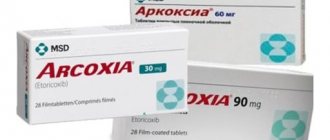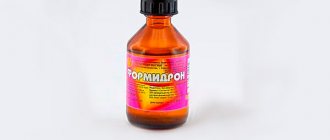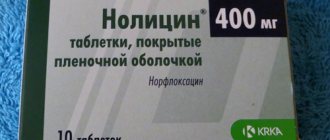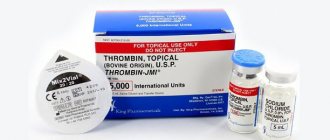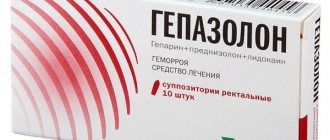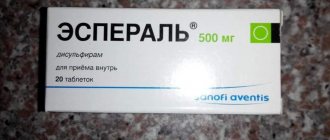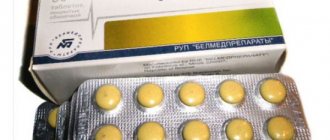Compound
One Lidevin tablet contains 300 mcg of nicotinamide or vitamin B3 , 500 mcg of adenine or vitamin B4 , and 500 mg of the active compound disulfiram .
As auxiliary compounds, the drug contains: povidone, magnesium stearate, sodium carboxymethylcellulose, as well as microcrystalline cellulose.
Composition and packaging
Lidevine is presented in tablets in blisters, sold in tens. A regular box offers 2 dozen. There is no medicine in the form of drops or solution. Round tablets, color scheme: white + cream. There are inclusions, with a chamfer, a cross-shaped line. Per tablet:
- Disulfiram - 500 mg;
- Nikotinamid (B3) - 300 micrograms;
- Adenine (B4) - 500 mcg.
Addition: crospovidone, Sodium carboxy methyl cellulose, Magnesium stearate, microcrystalline cellulose. It is included in the clinical and pharmacological group of drugs that relieve the urge to drink.
Pharmacodynamics and pharmacokinetics
This combination drug, containing B vitamins , as well as disulfiram is actively used in the treatment of alcohol and drug addiction . Since disulfiram is an inhibitor of the liver enzyme acetaldehyde dehydrogenase , Lidevin can act on it, namely block it in order to increase the production of acetaldehyde , which, in turn, is a metabolite of ethyl alcohol .
Due to the effects of acetaldehyde, the drug causes an unpleasant reaction and negative sensations in patients when drinking alcohol, which can be expressed in the form of sudden flushes of blood to the face, vomiting, tachycardia, decreased blood pressure, and nausea. As a result, a person develops a conditioned reflex aversion to the smell and, especially, the taste of alcoholic beverages.
Already 12 hours after taking Lidevin, the maximum effect of the drug is achieved, which continues for another 14 days after the course of therapeutic treatment. It is worth especially emphasizing that the active compound disulfiram in combination with B quite effectively fights alcoholism .
It is also noteworthy that the pronounced clinical effect of the drug is noticeable even when consuming very small doses of alcoholic beverages. In comparison with similar drugs, Lidevin stands out due to its relatively small number of contraindications and side effects. The drug is used not only during treatment, but also in the prevention of hypovitaminosis , as well as neuropathy due to alcoholism.
Special instructions for the use of the drug Lidevin
Patients should be warned about the risk of developing an alcohol intolerance reaction (see INTERACTIONS). Disulfiram should be taken with caution in patients with hepatic and/or liver failure or hypothyroidism, especially if there is a risk of possible combination with alcohol (see SIDE EFFECTS). With the simultaneous use of the drug and alcohol, depression of consciousness up to the state of coma, cardiovascular collapse, and neurological complications can be observed. Treatment is symptomatic. During pregnancy and breastfeeding. Lidevin is contraindicated during pregnancy and breastfeeding. Children. The drug is not used in children under 18 years of age. The ability to influence the reaction rate when driving a vehicle or working with other mechanisms . The use of the drug negatively affects the reaction rate when driving vehicles or operating machinery, so the drug should not be prescribed to persons whose professional activities require rapid psychomotor reactions.
Contraindications
The drug has the following absolute contraindications:
- hypersensitivity;
- diseases of the organs of vision and hearing , for example, neuritis or glaucoma;
- emphysema;
- tuberculosis;
- diabetes;
- severe forms of cardiovascular diseases ;
- epilepsy;
- bronchial asthma;
- exacerbation of stomach ulcers ;
- polyneuritis;
- pregnancy;
- duodenal ulcer , in the acute stage;
- liver failure;
- oncological diseases;
- thyrotoxicosis.
With extreme caution, the drug is allowed to be used in cases of acute medical need and under the supervision of doctors during remission of a peptic ulcer , after psychosis and circulatory disorders , as well as in old age and in the stage of compensation for diseases of the cardiovascular system.
Pharmacological effects
A medicine to get rid of cravings for alcohol with the compound Disulfiram and Vit. B. Disulfiram is an acetaldehyde dehydrogenase inhibitor. By blocking acetaldehyde dehydrogenase, the acetaldehyde content increases. It gives negative sensations (the skin “burns”, nausea occurs, vomiting occurs, heart rhythm is disturbed, blood pressure decreases). Drinking after taking Lidevine will not bring pleasure: you will not like either the taste or the aroma.
The maximum effect is noticeable after 12 hours. after administration, lasts up to 2 weeks after discontinuation of the medication. Connection of Disulfiram with Vit. B3, B4 gives noticeable results when taking a tiny amount of alcoholic beverages. The toxic effects of Disulfiram are reduced, protection against alcoholic neuropathy and vitamin deficiency is provided.
Side effects
During treatment, Lidevin can cause such adverse reactions as:
- headache;
- hepatitis;
- confusion;
- angina pectoris;
- arrhythmia;
- unpleasant metallic taste in the mouth;
- asthenia;
- allergic reactions;
- neuritis;
- thrombosis;
- cerebral edema;
- collapse;
- convulsions;
- polyneuritis.
Side effects of the drug Lidevin
From the gastrointestinal tract : metallic taste in the mouth, bad breath (halitosis), nausea, vomiting, abdominal pain, diarrhea; unpleasant odor in patients with colostomy (associated with the presence of carbon sulfide). From the liver : an increase in transaminase levels is often observed; rarely - hepatitis, including the fulminant form of hepatitis with a fatal outcome (in patients without chronic alcoholism with allergic contact dermatitis caused by nickel). From the central nervous system : polyneuritis of the lower extremities, optic neuritis, psychoneurological disorders (memory loss, confusion), drowsiness and fatigue at the beginning of treatment, headache; with prolonged use, the development of encephalopathy and epileptic attacks or convulsions, the development of psychoses, exacerbation of polyneuritis, optic neuritis, memory impairment, asthenia, cerebral edema is possible. On the skin : allergic skin rash; when combined with alcohol, intense flushing on the face and erythema may occur. From the cardiovascular system : in some cases - heart rhythm disturbances, angina attacks; in patients with cardiovascular diseases, thrombosis of cerebral vessels may be observed (therefore, if there are complaints of paresthesia in the limbs and face, you should immediately stop using the drug) ; with prolonged use of the drug, the development of cardiovascular failure, myocardial infarction, collapse, arrhythmia is possible; cases of respiratory failure have been described.
Instructions for use of Lidevin (Method and dosage)
In accordance with the instructions for use of Lidevin, tablets are taken strictly 24 hours after the last drink. The recommended dose of the drug is 125-500 mg.
After a maximum of 10 days, medical workers take a disulfiram-alcohol sample from the patient, the results of which determine the effectiveness of therapeutic treatment. To consolidate the results in the future, patients can take 125-200 mg. drug per day for several years.
Lidevine
Release form, composition and packaging
The tablets are round, flat-cylindrical, white with a creamy tint, with possible inclusions, chamfered, with a cross-shaped mark on one side.
1 tab.
disulfiram 500 mg.
nicotinamide (vit. B3) 300 mcg.
adenine (vit. B4) 500 mcg
Excipients: povidone, microcrystalline cellulose, sodium carboxymethylcellulose, magnesium stearate.
Clinical and pharmacological group: Drug for the treatment of alcohol dependence
pharmachologic effect
A combined drug for the treatment of alcohol dependence, it is a combination of disulfiram with B vitamins.
Disulfiram is an acetaldehyde dehydrogenase inhibitor. Blocking acetaldehyde dehydrogenase leads to an increase in the concentration of acetaldehyde, which is a metabolite of ethyl alcohol. Acetaldehyde causes negative sensations (including flushing, nausea, vomiting, tachycardia, decreased blood pressure), which make drinking alcohol extremely unpleasant after taking Lidevin. This leads to a conditioned reflex aversion to the taste and smell of alcoholic beverages.
The maximum therapeutic effect is achieved 12 hours after oral administration and can last for 10-14 days after cessation of treatment.
The combination of disulfiram with vitamins B3 (nicotinamide) and B4 (adenine) provides a pronounced clinical effect when taking even small doses of alcohol, has minimal side effects, reduces the toxicity of disulfiram, and ensures the prevention of alcoholic neuropathy and hypovitaminosis.
Pharmacokinetics
After oral administration, the absorption of disulfiram from the gastrointestinal tract is 70-90%. Disulfiram is rapidly metabolized, being reduced to dithiocarbamate, which is excreted as a glucuronic conjugate, or converted to diethylamine and carbon sulfide, part of which (4-53%) is excreted through the lungs.
Indications
- treatment and prevention of relapse of chronic alcoholism.
Dosage regimen
The drug is prescribed after a thorough examination of the patient and warning about the consequences and complications of therapy.
The dose of the drug is set based on disulfiram and taken orally at 125-500 mg 2 times a day according to an individual regimen. After 7-10 days of therapy, a disulfiramalcohol test is carried out (20-30 ml of 40% vodka after taking 500 mg of the drug); if the reaction is weak, the dose of alcohol is increased by 10-20 ml (the maximum dose is 100-120 ml). The test is repeated after 1-2 days in the hospital and after 3-5 days on an outpatient basis, if necessary, with adjustment of the doses of alcohol and/or drug. In the future, you can use a maintenance dose of 125-200 mg/day for 1-3 years.
Side effect
Effects due to the action of disulfiram: metallic taste in the mouth, unpleasant odor in patients with colostomy (associated with carbon sulfide), polyneuropathy of the lower extremities, optic neuritis, memory impairment, confusion, asthenia, headaches, skin allergic reactions; in some cases - hepatitis (in patients with nickel eczema who do not suffer from chronic alcoholism).
Effects caused by the interaction of disulfiram and ethyl alcohol: possible arrhythmia, angina attacks; sometimes - myocardial infarction, neurological disorders; in isolated cases - respiratory failure, cardiovascular collapse, cerebral edema.
Effects associated with long-term use of the drug: rarely - psychosis (reminiscent of alcoholism), hepatitis, gastritis; in patients with cardiovascular diseases - thrombosis of cerebral vessels, exacerbation of polyneuritis.
When drinking alcohol in quantities exceeding 50-80 ml of 40% vodka, severe dysfunction of the cardiovascular and respiratory systems, edema, and convulsions may develop. In this case, detoxification therapy is urgently carried out, analeptics are administered, and if necessary, additional symptomatic therapy is indicated.
Contraindications
Absolute:
- diseases of the cardiovascular system in the stage of decompensation;
- neuritis of the auditory nerve;
- glaucoma;
- optic neuritis;
- bronchial asthma;
- emphysema;
- pulmonary tuberculosis;
- severe liver failure;
- hematopoietic disorders;
- diabetes;
- thyrotoxicosis;
- epilepsy and convulsive syndrome of any origin;
- mental illness;
- gastric ulcer in the acute phase;
- kidney diseases;
- malignant neoplasms;
- polyneuritis of various etiologies;
- pregnancy;
- hypersensitivity to the components of the drug.
Relative:
- cardiovascular diseases in the compensation stage;
- old age (over 60 years);
- peptic ulcer of the stomach and duodenum in remission;
- residual effects after cerebrovascular accident;
- history of disulfiram (antabuse) psychosis.
The drug should be used with caution in patients with hypothyroidism, especially if there is a risk of possible combination with alcohol.
Pregnancy and lactation
Lidevin is contraindicated for use during pregnancy.
Use for liver dysfunction
The drug is contraindicated for use in severe liver failure.
Use for renal impairment
The drug is contraindicated for use in kidney disease.
special instructions
It is necessary to warn patients about the possible consequences of simultaneous consumption of alcohol or taking medications containing ethanol.
Overdose
Currently, no cases of overdose of Lidevin have been reported.
When taking the drug and alcohol simultaneously, depression of consciousness up to coma, cardiovascular collapse, and neurological complications are possible.
Treatment: symptomatic therapy.
Drug interactions
Combinations are contraindicated
When taken simultaneously with alcohol, an intolerance reaction develops (flushes, erythema, vomiting, tachycardia). Drinks and medications containing ethanol should be avoided.
Undesirable combinations
With the simultaneous use of Lidevin and isoniazid, behavioral and coordination disorders may occur.
When used simultaneously with drugs from the group of nitro-5-imidazole derivatives (metronidazole, ornidazole, secnidazole, tinidazole), delirious disorders and confusion may develop.
When used simultaneously with phenytoin, the development of toxic effects of phenytoin is possible (due to a slowdown in its metabolism and an increase in plasma concentrations).
Combinations requiring caution
With the simultaneous use of Lidevin and warfarin (or other oral anticoagulants), the risk of bleeding increases due to the increased effect of warfarin (slowing down the biotransformation of the latter).
Lidevin slows down the biotransformation of theophylline, therefore, with simultaneous use, a reduction in the dose of theophylline is required depending on the clinical symptoms and its concentration in the blood plasma.
With simultaneous use, Lidevin potentiates the sedative effect of benzodiazepines by inhibiting the oxidative pathway of metabolism of the latter, especially chlordiazepoxide and diazepam. The dose of benzodiazepine should be adjusted according to clinical manifestations.
With the simultaneous use of Lidevin and tricyclic antidepressants, alcohol intolerance reactions may increase, especially if patients drink alcohol while taking Lidevin.
Storage conditions and periods
The drug should be stored out of the reach of children, at a temperature not exceeding 25°. Shelf life: 3 years.
Interaction
ethyl alcohol , even in small doses Deviations in behavior and loss of coordination may occur when using the drug together with Isoniazid .
Symptoms such as confusion and delirium occur with the combined use of Lidevin and drugs such as Ornidazole, Tinidazole, Metronidazole and Secnidazole. To avoid a toxic effect, it is not advisable to use the drug together with Phenytoin .
Lidevin and Warfarin , because the risk of bleeding increases, Benzodiazepine , due to inhibition of oxidative metabolism, as well as Theophylline , so as not to slow down the biotransformation of the active compound included in the latter drug. When using antidepressants together with disulfiram , alcohol intolerance may increase.
Interactions of the drug Lidevin
Contraindicated combinations Alcohol: intolerance reaction (flushes, erythema, vomiting, tachycardia). You should not drink alcoholic beverages or medications containing alcohol. When drinking alcohol in quantities greater than 50–80 ml of 40% ethanol, severe dysfunction of the cardiovascular and respiratory systems, edema, and convulsions may develop. In this case, detoxification therapy is immediately carried out, analeptics are administered, and symptomatic treatment is carried out. Undesirable combinations: - isoniazid: disturbance of behavior and coordination of movements; - nitro-5-imidazoles (metronidazole, ornidazole, secnidazole, tinidazole): delirious disorders, confusion. - phenytoin: a significant and rapid increase in the level of phenytoin in the blood plasma with toxic symptoms (as a result of suppression of its metabolism). If the combination cannot be avoided, clinical observation and monitoring of drug plasma concentrations should be carried out during and after treatment with disulfiram. Combinations requiring increased caution:
- warfarin (and other oral anticoagulants): increased effect of oral anticoagulants and risk of bleeding (reduced breakdown of warfarin in the liver). More frequent monitoring of warfarin concentrations and dose adjustment of anticoagulants is recommended for 8 days after discontinuation of disulfiram;
- theophylline: Disulfiram inhibits the metabolism of theophylline. Therefore, the dose of theophylline should be adjusted (dose reduction) depending on the clinical symptoms and the concentration of the drug in the blood plasma;
- Benzodiazepines: Disulfiram may potentiate the sedative effect of benzodiazepines by inhibiting their oxidation (especially chlordiazepoxide and diazepam). It is necessary to adjust the benzodiazepine dose according to clinical manifestations;
- tricyclic antidepressants: the alcohol intolerance reaction may be exacerbated if patients treated with disulfiram drink alcohol.
Analogs
Level 4 ATC code matches:
Antaxon
Metadoxyl
Antabuse
Vivitrol
Naltrexone
Medichronal
Disulfiram
Teturam
Colma
Proprothene-100
Esperal
Drugs similar to Lidevin include:
- Antabuse;
- Teturam;
- Disulfiram;
- Esperal;
- Colma.
Compounds that suggest unpleasant consequences
Lidevin plus varfarin (other oral anticoagulants) - the possibility of bleeding increases due to increased exposure to varfarin. Because of Lidevin, the biological transformation of theophylline is reduced, it is necessary to reduce the amount of theophylline based on clinical symptoms and content in the blood plasma. Lidevine gives the sedative effect of benzodiazepines due to inhibition of the oxidative metabolic pathway, this is the case for chlordiazepoxide, diazepam. The amount of benzodiazepine is calculated based on clinical signs. When taken with tricyclic antidepressants, a strong aversion to drinking is observed, especially when Lidevin is taken with vodka.
Reviews about Lidevin
On the Internet you can find many both negative and positive reviews from doctors and patients about this drug. It is worth noting that often on forums people ask the question of which drug is more effective in combating alcoholism, Lidevin or Colme .
Many people prefer to use the latter drug because it has far fewer contraindications and side effects. We can say that, in general, reviews of Lidevin in the treatment of alcoholism are positive. Although many patients are afraid to take the drug because of possible side effects.
Lidevin application
Lidevin is used to treat chronic alcoholism. This drug works as follows: the liver of each person contains, among others, two enzymes. One of them is responsible for processing ethanol, but the second removes acetaldehyde - the very substance that results from the breakdown of ethanol and which causes alcohol intoxication.
Disulfiram, the main active ingredient in Lidevin, blocks the second enzyme, the same one that removes acetaldehyde. This use of Lidevin leads to the fact that any portion of alcohol immediately leads to a sharp accumulation of toxins, which causes a reaction similar to a severe hangover. Fever, dizziness, nausea and vomiting, surges in blood pressure and pulse, trembling of hands, etc. begin. And this will happen every time Disulfiram is in the blood. That is why Lidevin’s instructions require taking pills daily.
Caution - danger!
A coded person must know that he is taking Lidevin. He must agree to this and be aware of possible side effects. Otherwise, the alcoholic may continue to pour new portions of alcohol into himself, trying to drown out the pain, and this can lead to partial loss of hearing, vision, significant breathing difficulties and even death. That is why the use of Lidevin necessarily requires the patient’s desire to get rid of addiction. Another reason why you should not try to mix Lidevin without the person’s knowledge is a wide range of contraindications. Any drug based on Disulfiram really has a lot of them, and only a doctor can give an unambiguous answer as to whether Lidevin can be used for coding in a particular case. If not, there are other coding options available today. Read Lidevin reviews on the Internet and you will see what self-medication can lead to.
Indications and prohibitions for use
Lidevin tablets are prescribed by a narcologist when signs of alcohol dependence are detected. Often this drug is used to prevent relapses of the disease.
The instructions for use note that the medicine rarely causes side effects, but contraindications must be carefully studied. An absolute ban on taking such pills applies to people suffering from:
- tuberculosis, asthma, emphysema;
- pathologies of the endocrine system (thyrotoxicosis);
- neuritis of the auditory or optic nerve, glaucoma;
- severe diseases of the gastrointestinal tract (renal and liver disorders).
It is not recommended to take Lidevin if you have hypothyroidism or after a stroke.
Nutrition for the patient being treated
Appetite increases, this is a positive sign of normalizing the functioning of the endocrine system. The body shows: there are few vitamins, minerals, amino acids, they are not enough for trouble-free functioning and the passage of biochemical processes. Lidevin should be taken while taking vitamin-mineral complexes or multivitamins. The substances help quickly put the body in order after periods of heavy drinking. The diet includes greens, boiled food, slimy porridges, low-fat soups, vegetables, and fish. Nutrition contributes to the speedy recovery of the body. Amaranth and linseed oils are added, which reduce the degree of addiction to drinking and saturate with important substances.
Results and reviews
Unfortunately, it is impossible to use such a medicine for alcoholism without the knowledge of the patient. Mandatory prior consultation is required. At the same time, the reputation of the tablets is very good.
“I took Lidevin on the advice of a narcologist. It’s actually easier to give up alcohol when it makes you feel very sick. The main thing is to force yourself to take the drug, then it’s easier...”
There is, of course, a negative side. Negative reviews usually arise from people who have not found sufficient motivation for treatment.

